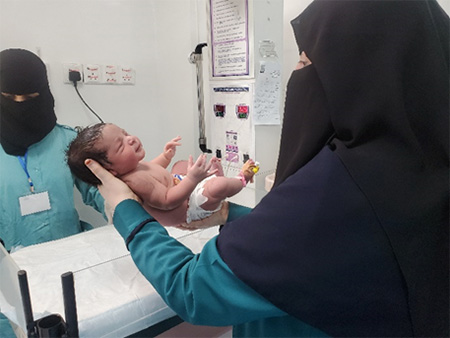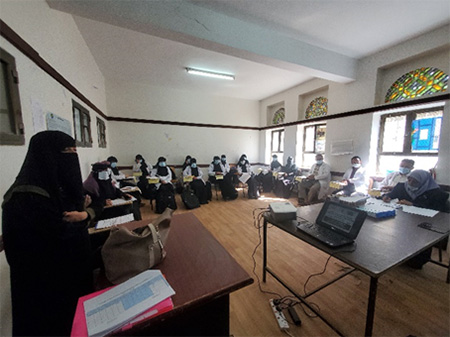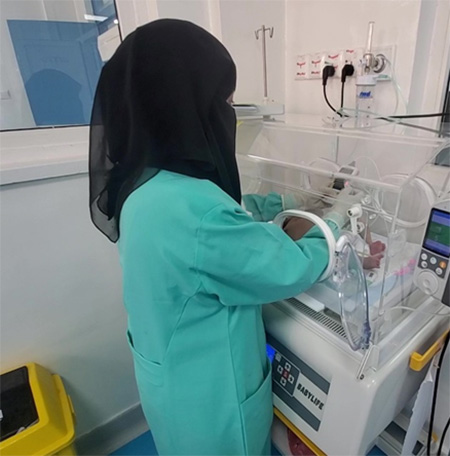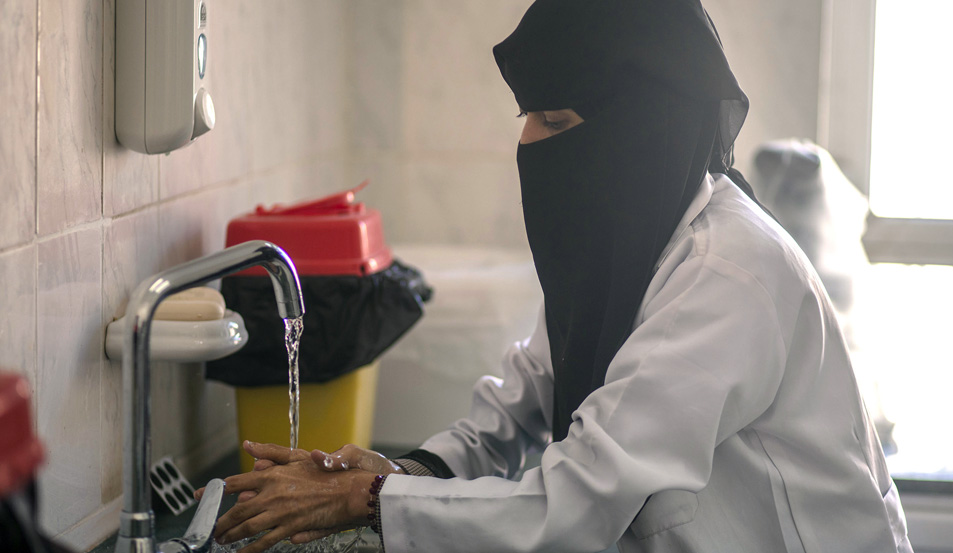Improving health care skills to save newborn lives
 Sana’a, 21 March 2022 – Millions of newborn babies globally are denied the chance to grow and thrive due to complications in pregnancy and childbirth. In Yemen, estimates suggest that a newborn baby dies every 20 minutes.
Sana’a, 21 March 2022 – Millions of newborn babies globally are denied the chance to grow and thrive due to complications in pregnancy and childbirth. In Yemen, estimates suggest that a newborn baby dies every 20 minutes.
To give newborns the best start in life, the health authorities in Yemen, with the support of WHO and the World Bank, are striving to improve the quality of care.
To this end, the health authorities have drafted a national operational nursing guide for newborns. The guide was developed by an expert group of paediatricians, nurses and health care practitioners. It is now being pilot tested in intensive training to enhance the knowledge and skills of nurses working in neonatal intensive care units.
Over the past three weeks, 24 senior nurses from 16 hospitals in seven northern governorates (Al-Hudaydah, Saa’da, Hajjah, Ibb, Dhamar, Al-Mahweet, Amran) have come together to look at how to build nursing skills for newborn care across hospitals in Yemen. The 17-day training, which took place in Al-Sabeen hospital in Sana’a, included four days of theory and a strong on-the-job practical component.
 One of the participants, Tahani Al-San’ani, a nurse from Al-Jomhuri Hospital, Al-Mahweet Governorate, described how valuable she found the training and says she hopes more health workers will be able to benefit from this experience.
One of the participants, Tahani Al-San’ani, a nurse from Al-Jomhuri Hospital, Al-Mahweet Governorate, described how valuable she found the training and says she hopes more health workers will be able to benefit from this experience.
“This training helped me develop my skills and knowledge on blood transfusion, how to prepare for it and what are the measures followed afterwards. I hope this kind of training will continue being provided for health care workers, and the skills we’ve learned will be transferred to our colleagues in other governorates,” she says.
WHO and the health authorities are planning to include the nursing skills identified during the training as necessary within the national nursing guide.
 WHO will also work with the authorities to conduct regular visits to supervise the performance of the trained staff. The supervision teams will also review nursing care records for neonatal health indicators to see if there has been an improvement in performance.
WHO will also work with the authorities to conduct regular visits to supervise the performance of the trained staff. The supervision teams will also review nursing care records for neonatal health indicators to see if there has been an improvement in performance.
Drawing on the lessons learnt from this pilot training, further training sessions are planned for the southern governorates.
Note: The Emergency Health and Nutrition Project (EHNP) implemented by WHO with support from the Word Bank, has contributed towards the delivery of essential services in 72 hospitals in Yemen between 2017 and 2022. Since September 2021, the Emergency Human Capital Project (EHCP) has been providing essential health and nutrition services to the Yemeni people.
Learn more:
WHO Yemen: ensuring access to clean water in health facilities

20 March 2022- Thousands of Yemeni children and adolescents suffer from thalassemia, a genetic blood disorder that causes anemia, fatigue, stunting, and even death. The disorder is manageable with blood transfusions and iron-chelating drugs, and patients who are treated can live normal lives. But the country's ongoing conflict has severely disrupted the supply of essential medicines for blood disorders, putting the health and lives of patients at risk.
Fighting to survive: saving the lives of Yemeni malnourished children
Hajjah, 1 March 2022 – Seven years of conflict in Yemen have taken a heavy toll on the population with serious humanitarian consequences. About 2.3 million children under-five-years-old in Yemen were estimated in 2021 to have acute malnutrition with 400,000 severe cases including 40,000 with medical complications. These children are fighting every day for their lives and need immediate, specialized lifesaving care to survive.
A child with severe acute malnutrition is 9 times more likely to die than a well-nourished child. That’s why WHO’s work to sustain lifesaving care at more than 109 therapeutic feeding centers across Yemen, is so important.
Hajjah is one of the governorates with the highest prevalence of acute malnutrition. WHO through the Emergency Health and Nutrition Project (EHNP) and its successor the Emergency Human Capital Project (EHCP), both funded by the World Bank, are making critical nutrition services available to the most vulnerable communities. Eight therapeutic feeding centres are supported in Hajjah, with needed rehabilitations, furnishing, equipment, supplies and therapeutic milk.
 A caregiver next to her malnourished baby at the therapeutic feeding centre in AL-Humjori Hospital, Hajjah City.
A caregiver next to her malnourished baby at the therapeutic feeding centre in AL-Humjori Hospital, Hajjah City.
These investments mean that care is provided 24 hours a day, 7 days a week, to make sure children get the treatment needed to save their lives. Of the children admitted to these facilities, more than 90% survive. In 2021, 2507 children were cured of severe malnutrition.
Baby Jihad makes a full recovery in two weeks in Hajjah
1 March 2022- In a household in Bani Qais, 121 kilometres west of Hajjah City, a family watched with concern as their baby daughter, Jihad, was losing weight day by day. After one week of suffering at home, Jihad’s body started to swell. Her parents suffer from extreme financial difficulties and were worried they did not have the means to get their daughter the medical care she urgently needed.
Still, they walked two kilometers to reach the nearest health center. When they arrived, after the first assessment, the health worker advised that Jihad had to be transferred to Al-Jumhori Public Hospital therapeutic feeding centre in Hajjah urgently to save her life. However, her father had no money to pay the transportation cost.
Fortunately, the health center director was about to travel to Hajjah by car and offered them a ride. Jihad’s father was grateful but still concerned: “We are happy to finally be able to bring our child to the hospital, but I am worried about the expenses of the treatment which I am unable to afford.” He soon learned that his child would be provided with the full treatment without payment.
Jihad was in critical condition when she first came into the therapeutic feeding centre, but slowly and surely her health started to improve. After 14 days of treatment and monitoring, Jihad was ready to leave the hospital with a big smile on her face and that of her parents. “I am very thankful that my daughter has a new chance at life and a new beginning,” Jihad’s mother said.
 Baby Jihad after starting treatment (left) and two weeks later when she recovered and was ready to return home (right)
Baby Jihad after starting treatment (left) and two weeks later when she recovered and was ready to return home (right)
Note: WHO through the Emergency Health and Nutrition Project (EHNP) and its successor the Emergency Human Capital Project (EHCP), both funded by the World Bank, supports 109 therapeutic feeding centres across Yemen, including the one at Al-Jumhori Public Hospital in Hajjah.


